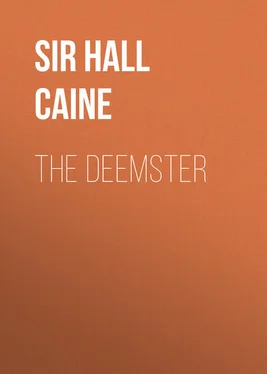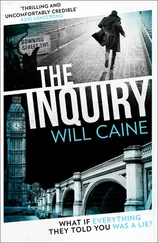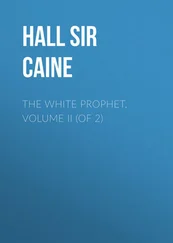Hall Caine - The Deemster
Здесь есть возможность читать онлайн «Hall Caine - The Deemster» — ознакомительный отрывок электронной книги совершенно бесплатно, а после прочтения отрывка купить полную версию. В некоторых случаях можно слушать аудио, скачать через торрент в формате fb2 и присутствует краткое содержание. ISBN: , Жанр: foreign_antique, foreign_prose, на английском языке. Описание произведения, (предисловие) а так же отзывы посетителей доступны на портале библиотеки ЛибКат.
- Название:The Deemster
- Автор:
- Жанр:
- Год:неизвестен
- ISBN:http://www.gutenberg.org/ebooks/35781
- Рейтинг книги:5 / 5. Голосов: 1
-
Избранное:Добавить в избранное
- Отзывы:
-
Ваша оценка:
- 100
- 1
- 2
- 3
- 4
- 5
The Deemster: краткое содержание, описание и аннотация
Предлагаем к чтению аннотацию, описание, краткое содержание или предисловие (зависит от того, что написал сам автор книги «The Deemster»). Если вы не нашли необходимую информацию о книге — напишите в комментариях, мы постараемся отыскать её.
The Deemster — читать онлайн ознакомительный отрывок
Ниже представлен текст книги, разбитый по страницам. Система сохранения места последней прочитанной страницы, позволяет с удобством читать онлайн бесплатно книгу «The Deemster», без необходимости каждый раз заново искать на чём Вы остановились. Поставьте закладку, и сможете в любой момент перейти на страницу, на которой закончили чтение.
Интервал:
Закладка:
Thorkell's face whitened, and he bowed his head.
"A successor must soon be appointed, and the Deemster is always a Manxman; he must know the language of the common people."
Thorkell's face wore a bewildered expression. The lady's manner was very suave.
"The appointment is the gift of the Lord of the island, and the Duchess is asked to suggest a name."
Thorkell's face lightened. He had regained all his composure.
"The Duchess has heard a good account of you, Mr. Mylrea. She is told that by your great industry and – wisdom – you have raised yourself in life – become rich, in fact."
The lady's voice dropped to a tone of most insinuating suavity. Thorkell stammered some commonplace.
"Hush, Mr. Mylrea, you shall not depreciate yourself. The Duchess has heard that you are a man of enterprise – one who does not begrudge the penny that makes the pound."
Thorkell saw it all. He was to be made Deemster, but he was to buy his appointment. The Duchess had lost money of late, and the swashbuckler court she kept had lately seen some abridgment of its gaieties.
"To be brief, Mr. Mylrea, the Duchess has half an intention of suggesting your name for the post, but before doing so she wished me to see in what way your feelings lie with regard to it."
Thorkell's little eyes twinkled, and his lips took an upward curve. He placed one hand over his breast and bent his head.
"My feelings, madam, lie in one way only – the way of gratitude," he said, meekly.
The lady's face broadened, and there was a pause.
"It is a great distinction, Mr. Mylrea," said the lady, and she drew her breath inward.
"The greater my gratitude," said Thorkell.
"And how far would you go to show this gratitude to the Duchess?"
"Any length, madam," said Thorkell, and he rose and bowed.
"The Duchess is at present at Bath – "
"I would go so far, and – further, madam, further," said Thorkell, and as he spoke he thrust his right hand deep into his pocket, and there – by what accident may not be said – it touched some coins that chinked.
There was another pause, and then the lady rose and held out her hand, and said, in a significant tone:
"I think, sir, I may already venture to hail you as Deemster of Man."
Thorkell cantered home in great elevation of soul. The milestones fell behind him one after one, and he did not feel the burden of the way. His head was in his breast; his body was bent over his saddle-bow; again and again a trill of light laughter came from his lips. Where were his dreams now, his omens, his spells, and the power of the evil eye? He was judge of his island. He was master of his fate.
Passing through St. John's, he covered the bleak top of the hill, and turned down toward the shady copse of Kirk Michael. Where the trees were thickest in the valley he drew rein by a low, long house that stood back to the road. It was the residence of the Bishop of the island, but it was now empty. The bishopric had been vacant these five years, and under the heavy rains from the hills and the strong winds from the sea, the old house had fallen into decay.
Thorkell sat in the saddle under the tall elms in the dim light, and his mind was busy with many thoughts. His memory went back with something akin to tenderness to the last days of old Ewan, his father; to his brother, Gilcrist, and then, by a sudden transition, to the incidents of that morning at Castle Rushen. How far in the past that morning seemed to be!
The last rook had cawed out its low guttural note, and the last gleam of daylight died off between the thick boughs of the dark trees that pattered lightly overhead, as Thorkell set off afresh.
When he arrived at Ballamona the night was dark. The Archdeacon was sitting with his daughter, who had not left her room that day. Thorkell, still booted and spurred, ran like a squirrel up the stairs and into the bedroom. In twenty hot words that were fired off like a cloud of small shot from a blunderbuss, Thorkell told what had occurred. His wife's white face showed no pleasure and betrayed no surprise. Her silence acted on Thorkell as a rebuke, and when her eyes rested on his face he turned his own eyes aside. The Archdeacon was almost speechless, but his look of astonishment was eloquent, and when Thorkell left the room he followed him out.
At supper the Archdeacon's manner was that of deep amity.
"They are prompt to appoint a Deemster," he said. "Has it not struck you as strange that the bishopric has been vacant so long?"
Thorkell laughed a little over his plate, and answered that it was strange.
"Maybe it only needs that a name should be suggested," continued the Archdeacon. "That is to say, suggested by a man of influence – a man of position – by the Deemster, for instance."
"Just that," said Thorkell, with a titter.
Then there was an interchange of further amity. When the two men rose from the table the Archdeacon said, with a conscious smile, "Of course, if you should occur – if you should ever think – if, that is, the Deemster should ever suggest a name for the bishopric – of course, he will remember that – that blood, in short, is thicker than water — ta fuill my s'chee na ushtey , as the Manxman says."
"I will remember it," said Thorkell, in a significant tone, and with a faint chuckle.
Satisfied with that day's work, with himself, and with the world, Thorkell then went off to bed, and lay down in peace and content, and slept the sleep of the just.
In due course Thorkell Mylrea became Deemster Ballamona.
He entered upon his duties after the briefest study of the Statute Laws. A Manx judge dispensed justice chiefly by the Breast Laws, the unwritten code locked in his own breast, and supposed to be handed down from Deemster to Deemster. The popular superstition served Thorkell in good stead: there was none to challenge his knowledge of jurisprudence.
As soon as he was settled in his office he began to make inquiries about his brother Gilcrist. He learned that after leaving Cambridge, Gilcrist had taken deacon's orders, and had become tutor to the son of an English nobleman, and afterward chaplain to the nobleman's household. Thorkell addressed him a letter, and received a reply, and this was the first intercourse of the brothers since the death of old Ewan. Gilcrist had lately married; he held a small living on one of the remote moors of Yorkshire; he loved his people and was beloved by them. Thorkell wrote again and again, and yet again, and his letters ran through every tone of remonstrance and entreaty. The end of it was that the Deemster paid yet another visit to the lady deputy at Castle Rushen, and the rumor passed over the island that the same potent influence that had made Thorkell a Deemster was about to make his brother the Bishop of Man.
Then the Archdeacon came down in white wrath to Ballamona, and reminded his son-in-law of his many obligations, touched on benefits forgot, hinted at dark sayings and darker deeds, mentioned, with a significant accent, the girl Mally Kerruish, protested that from causes not to be named he had lost the esteem of his clergy and the reverence of his flock, and wound up with the touching assurance that on that very morning, as he rode from Andreas, he had overheard a burly Manxman say to the tawny-headed fellow who walked with him – both of them the scabbiest sheep on the hills – "There goes the pazon that sold his daughter and bought her husband."
Thorkell listened to the torrent of reproaches, and then said, quietly, as he turned on his heel, "Near is my shirt, but nearer is my skin."
The Deemster's wife held up her head no more. After the christening she rarely left her room. Her cheeks grew thinner, paler they could not grow, and her meek eyes lost their faint lustre. She spoke little, and her interest in life seemed to be all but gone. There was the same abject submission to her husband, but she saw less of him day by day. Only the sight of her babe, when Kerry brought it to be nursed, restored to her face the light of a fleeting joy. If it stayed too long at her breast, if it cried, if its winsome ways made her to laugh outright, the swift recoil of other feelings saddened her to melancholy, and she would put the child from her with a sigh. This went on for several months, and meantime the Deemster was too deeply immersed in secular affairs to make serious note of the shadow that hung over his house. " Goll sheese ny lhiargagh – she's going down the steep places," said Kerry.
Читать дальшеИнтервал:
Закладка:
Похожие книги на «The Deemster»
Представляем Вашему вниманию похожие книги на «The Deemster» списком для выбора. Мы отобрали схожую по названию и смыслу литературу в надежде предоставить читателям больше вариантов отыскать новые, интересные, ещё непрочитанные произведения.
Обсуждение, отзывы о книге «The Deemster» и просто собственные мнения читателей. Оставьте ваши комментарии, напишите, что Вы думаете о произведении, его смысле или главных героях. Укажите что конкретно понравилось, а что нет, и почему Вы так считаете.












